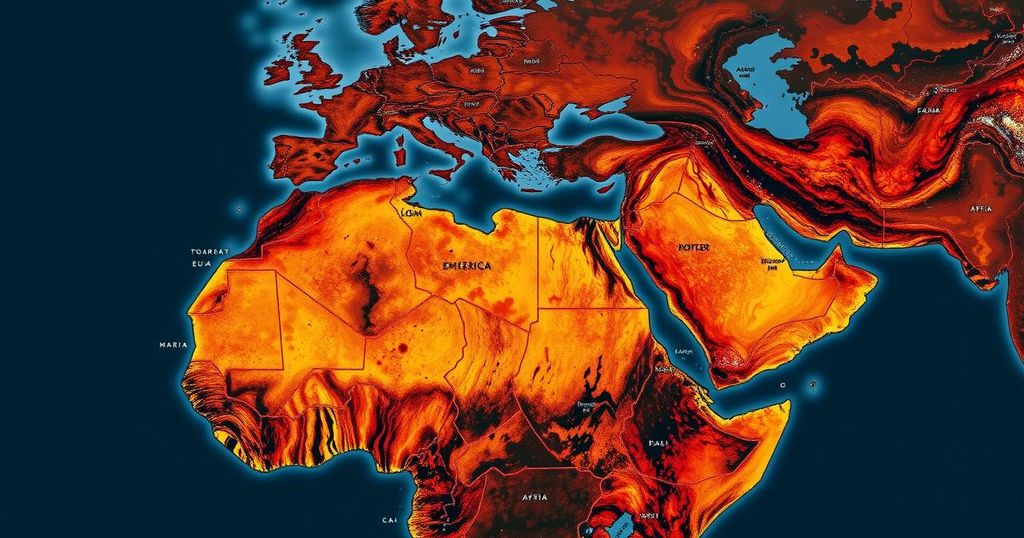Egypt’s Strategic Alliances Respond to Ethiopian Influence in the Horn of Africa

Egypt, Eritrea, and Somalia’s recent summit in Asmara ushered in a new trilateral military alliance aimed at countering Ethiopia’s influence, particularly regarding the Grand Ethiopian Renaissance Dam. With rising tensions over Nile water rights and military agreements enhancing Egypt’s position in the Horn of Africa, experts foresee a potential conflict as each country repositions its alliances.
In early October, leaders from Egypt, Eritrea, and Somalia convened in Asmara for a trilateral summit to foster regional cooperation. During this meeting, the presidents pledged to support Somalia’s counterterrorism efforts and agreed to deploy troops under the African Union mission. Observers perceive this as Egypt’s strategic countermeasure to Ethiopia’s expanding regional power, especially following Ethiopia’s memorandum with Somaliland earlier this year, which involves leasing coastline for military purposes in exchange for recognition of its independence. Egypt continues to experience diplomatic tensions with Ethiopia related to the Grand Ethiopian Renaissance Dam (GERD), which Cairo views as a significant threat to its national security. In addition, the recent activation of the Entebbe Agreement, which governs the Nile River’s water management, has heightened concerns for both Egypt and Sudan regarding water security. According to Iman Abdel Azim, a political science professor, the Asmara summit reflects Egypt’s desire to rebuild alliances within Africa through strategic military and diplomatic partnerships. She notes that since 2019, Egypt has focused on strengthening ties with African nations, culminating in military agreements with both Somalia and Eritrea. These agreements have prompted military cooperation that includes the shipment of arms from Egypt to Somalia and a mutual defense pact with Eritrea. Amani El-Tawil, Director of the African Program at the Al-Ahram Centre, suggests that Egypt’s alliances reflect a shift towards more military-focused interactions aimed at countering Ethiopia’s maneuvers in the region. This includes Ethiopia’s unilateral development of the GERD and its influence over South Sudan regarding the Entebbe Agreement. The filling of the GERD has reportedly reduced Egypt’s water supply sharply, forcing the country to rely on reserves from the Aswan High Dam. Experts stress that despite efforts like wastewater treatment and restrictions on water-intensive agriculture, Egypt’s water crisis remains critical. Following years of failed negotiations regarding Nile waters, former Egyptian officials, such as Ambassador Mona Omar, assert that Egypt has exhausted its diplomatic options and is now pivoting toward securing military alliances. Abdel Azim argues that Ethiopia’s diplomatic successes demonstrate the diminishing influence of Egypt in Africa when compared to the era of President Gamal Abdel Nasser. While Nasser’s Egypt was influential in supporting African independence movements, subsequent administrations reduced this focus, weakening Egypt’s position in regional matters. Currently, the dynamics of the Horn of Africa are shifting, with Ethiopia’s outreach to Somaliland and Egypt’s military strategy suggesting an upcoming conflict as each nation seeks to solidify its influence in the region. Ethiopia’s maneuvers have prompted a realignment amongst the Nile Basin countries towards Egypt, particularly as Eritrea views Ethiopia’s peace agreements with its historic adversaries as threatening.
The Horn of Africa has been a focal point of regional tensions particularly due to the historical relationships and disputes surrounding water rights related to the Nile River. Egypt and Ethiopia have long been at odds over the Grand Ethiopian Renaissance Dam, a major project that Ethiopia sees as essential for its development, while Egypt views it as a threat to its vital water supply. The strategic positioning of nations like Eritrea and Somalia becomes crucial as they navigate their alliances and resist being pawns in the Egypt-Ethiopia dynamic, which fluctuates based on regional influences and agreements. The recent summit in Asmara, aimed at military support for Somalia, illustrates Egypt’s proactive approach to regaining influence lost over the years and forming a counterweight to Ethiopia’s escalating power in the region.
In summary, Egypt’s recent military and diplomatic initiatives in the Horn of Africa highlight its strategic response to the perceived threat posed by Ethiopia’s growing influence, particularly with the GERD and the endorsements from the Entebbe Agreement. Through high-level meetings and military agreements with neighboring states, Egypt aims to reinvigorate its alliances and assert its influence, reshaping the geopolitical landscape of the region. The unfolding dynamics suggest a possible escalation of conflicts as Egypt attempts to consolidate support against Ethiopia’s regional ambitions, amidst ongoing water security challenges.
Original Source: www.newarab.com








